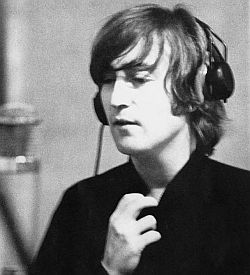The first session for what was to become the significant album Revolver. This set of recordings was destined to rock the rock world, change forever the course of popular music. And the closing song, "Tomorrow Never Knows" was the first to be taped. It took just three takes to tape "Tomorrow Never Knows" although by its very essence the recording was also the result of innumerable overdubs. In 1965, the Beatles' recordings had been progressing quite nicely, but here was a quantum jump into not merely tomorrow but sometime next week, "Tomorrow Never Knows" displaying an unrivalled musical progression and the Beatles' willingness first to observe the boundaries and then smash right through them.
The session took place in studio three at EMI Studios, Abbey Road, and lasted from 8pm-1.15am. At this time the song had the working title Mark I.
George Martin was, as ever, a vital ingredient in the process, always innovative himself, a tireless seeker of new sounds and willing translator of the Beatles' frequently vague requirements. Now he was joined by balance engineer Geoff Emerick, promoted to replace Norman Smith.
Revolver also heralded the first use of Artificial Double Tracking, invented by Abbey Road technical engineer Ken Townsend directly at the Beatles' request and now in use at studios worldwide. ADT saved the Beatles the chore of having to manually double-track their voices or instruments, an effect they so frequently sought. But "Tomorrow Never Knows" didn't only feature ADT - it also boasted tape loops and voices put through a Leslie speaker.
"Tomorrow Never Knows" featured, too, a John Lennon vocal that sounded like no other before, having been fed through the electronic circuitry of a revolving Leslie speaker (so named after its inventor, Donald J. Leslie) inside a Hammond organ technical innovation conceived by the Beatles, Martin, and Emerick team based upon composer Lennon's vision of 4000 monks chanting in the background of his song while he sang if perched on the highest mountain top. And all of this less than three years after "She Loves You".

